A few Moments with Baba Jan
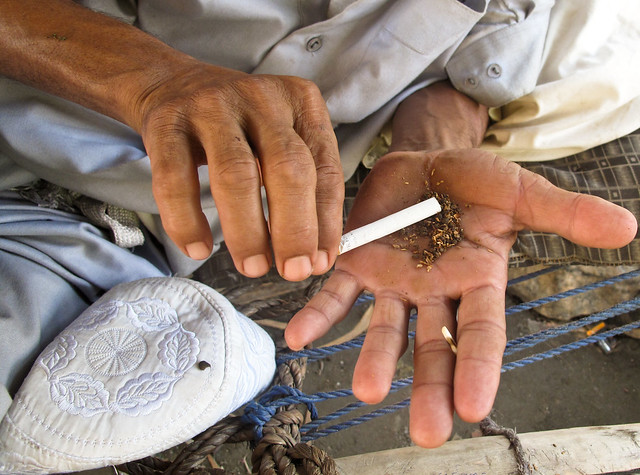
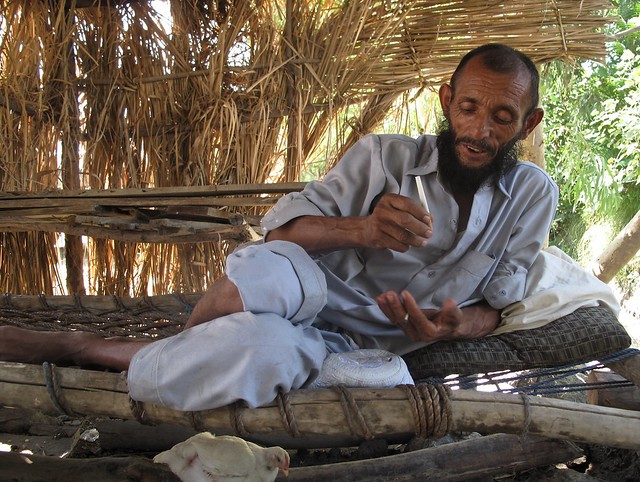 This is Baba Jan in the beautiful district of Kama. I was out with my mapping team when we met him. We were passing by his hut he gave us a shout and offered us watermelon. We stopped and sat down with him. He asked us to wait for him to finish his hash. “I enjoy the conversation then,” he said. Baba Jan has a small store right across from his hut which is run by his 9‑year-old daughter. He hard ever leaves his kut, the bed in the hut. He is a very hospitable person. There are always a bunch of youngsters sitting around him and he tells them tales of his youth.
This is Baba Jan in the beautiful district of Kama. I was out with my mapping team when we met him. We were passing by his hut he gave us a shout and offered us watermelon. We stopped and sat down with him. He asked us to wait for him to finish his hash. “I enjoy the conversation then,” he said. Baba Jan has a small store right across from his hut which is run by his 9‑year-old daughter. He hard ever leaves his kut, the bed in the hut. He is a very hospitable person. There are always a bunch of youngsters sitting around him and he tells them tales of his youth. He asked what brought us to their place and we told him about our mapping project on the open source site of OpenStreetMap. I told him about our endeavor to map the whole province for humanitarian and education purposes. He was happy and offered to show us around next time we were in town.
He asked what brought us to their place and we told him about our mapping project on the open source site of OpenStreetMap. I told him about our endeavor to map the whole province for humanitarian and education purposes. He was happy and offered to show us around next time we were in town.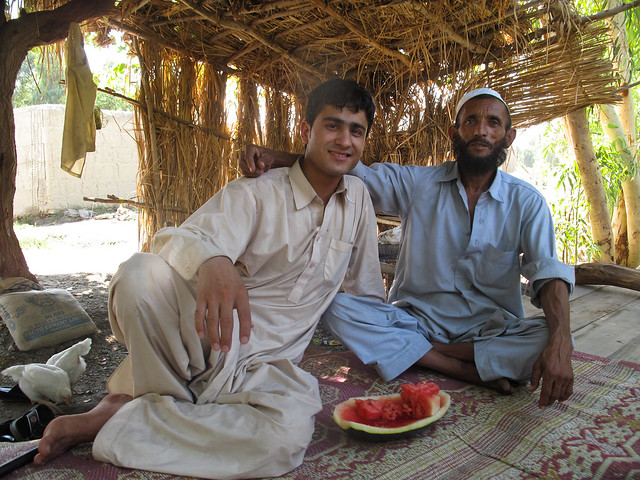 At the end I asked him for his phone number to visit him next time. He did not have a phone. Funny story how Baba Jan gives hash to a member of his gang in return for every phone call he makes from his phone.
At the end I asked him for his phone number to visit him next time. He did not have a phone. Funny story how Baba Jan gives hash to a member of his gang in return for every phone call he makes from his phone.
Addresses in Afghanistan
 Normally, in Afghanistan we don’t have street names and street numbers. There are some streets and almost all towns with names. Funny story how streets and some towns are named but before that: I was driving outside Jalalabad city the other day and I needed directions to a friend’s house. I asked a couple of famers with their shovels on their shoulders for directions to a friend’s house in the area. In rural areas where people live in small towns and closely connected villages everybody knows everybody. Even if they live in two geographically different villages they will tell you where everybody lives. This man went on and on about the directions. It got so confusing and I closed my eyes trying to navigate but it didn’t work. He named so many different colors of gates and doors, big and small trees, rights and lefts, nears and behinds, and Arabic names of mosques.
Normally, in Afghanistan we don’t have street names and street numbers. There are some streets and almost all towns with names. Funny story how streets and some towns are named but before that: I was driving outside Jalalabad city the other day and I needed directions to a friend’s house. I asked a couple of famers with their shovels on their shoulders for directions to a friend’s house in the area. In rural areas where people live in small towns and closely connected villages everybody knows everybody. Even if they live in two geographically different villages they will tell you where everybody lives. This man went on and on about the directions. It got so confusing and I closed my eyes trying to navigate but it didn’t work. He named so many different colors of gates and doors, big and small trees, rights and lefts, nears and behinds, and Arabic names of mosques.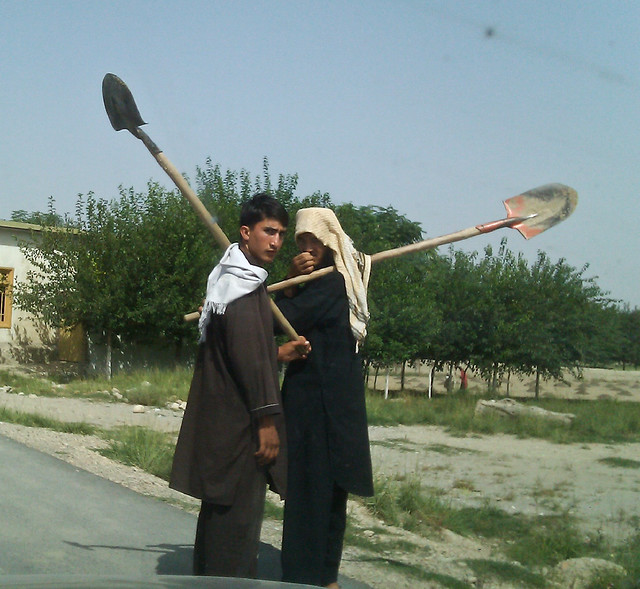 I apologized and I had him repeat the directions furtively turning my phone voice recorder on. There was no way I could’ve found the place without listening to that recording all the way to his door. It’s funny how some streets and some towns are named after someone prominent, rich, or notorious who lives on the street. For example, the street behind ours is called, “Multan Kaka Kosaâ€. Meaning Uncle Multan Street. It was named after the notorious fighter, Multan who has been in a physical fight or argument at least once with almost everyone in the neighborhood. Our street, da sarafano kosa, meaning the money exchangers street, was named after this wealthy supposedly “money exchanger†who was a night shift drug dealer. Though the “money exchanger” no longer lives in the neighborhood, it’s still called the money exchangers street.
I apologized and I had him repeat the directions furtively turning my phone voice recorder on. There was no way I could’ve found the place without listening to that recording all the way to his door. It’s funny how some streets and some towns are named after someone prominent, rich, or notorious who lives on the street. For example, the street behind ours is called, “Multan Kaka Kosaâ€. Meaning Uncle Multan Street. It was named after the notorious fighter, Multan who has been in a physical fight or argument at least once with almost everyone in the neighborhood. Our street, da sarafano kosa, meaning the money exchangers street, was named after this wealthy supposedly “money exchanger†who was a night shift drug dealer. Though the “money exchanger” no longer lives in the neighborhood, it’s still called the money exchangers street.
International Day of Peace
Everyday when I go to work, my mom tells me, “Have a good day, son.” Today was different. When I was saying goodbye to her this morning she came to the gate with me and said, “Be careful, OK?” Just go to you office and come back straight home, she said. September 21st was like any other day normal day in Jalalabad. Most of the time, when there is a national or international day of celebration and there are officials giving talks and messages, it turns into a tragedy. Sometimes, I think we make this day of peace, love and harmony more danger prone by ourselves by celebrating it with our so called “officials” and “leaders”. The International Day of Peace is a day that all human beings around the world can be in a state of mind with peace, love and a smile on their face with absolute lack of violence. People celebrate this day with their loved ones and like-minded people get together and celebrate it in their own way. There is no need for ribbon cutting and talks and messages from “peace leaders”, et. al. The UN has declared this day as a day of cessation of all hostilities among all individuals, groups, and nations. Unfortunately, we still hear news of killings and explosions and suicides on this day of peace. Mahatma Gandhi teaches in one of his top teachings for bringing about world peace: “Power is of two kinds. One is obtained by the fear of punishment and the other by acts of love. Power based on love is a thousand times more effective and permanent than the one derived from fear of punishment.” Let’s pay respect and salute to all of those people who have made (and are making) efforts to bring about world peace.
The UN has declared this day as a day of cessation of all hostilities among all individuals, groups, and nations. Unfortunately, we still hear news of killings and explosions and suicides on this day of peace. Mahatma Gandhi teaches in one of his top teachings for bringing about world peace: “Power is of two kinds. One is obtained by the fear of punishment and the other by acts of love. Power based on love is a thousand times more effective and permanent than the one derived from fear of punishment.” Let’s pay respect and salute to all of those people who have made (and are making) efforts to bring about world peace.
Government aid too late
A couple of weeks ago my colleagues and I went to Kama district for gathering data for mapping the area on the open source mapping site, Open Street Map, we came across a team of the government aid distributors. They were distributing mosquito nets. Now that the summer season is over and there will be almost no mosquito anymore, these people don’t need these nets this year.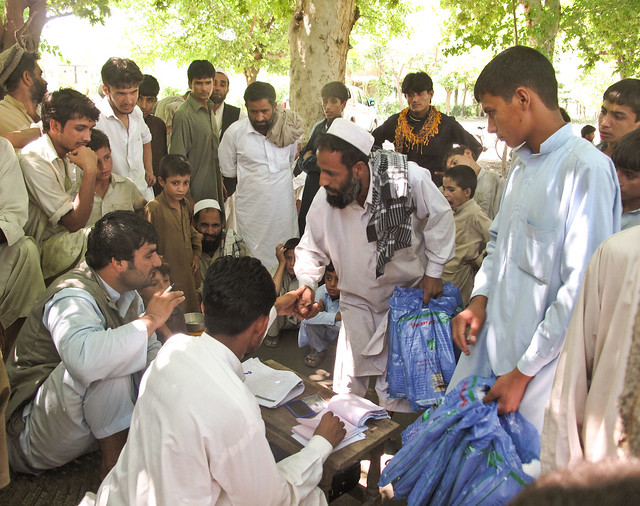 “We will keep them for next year”, said one of the locals. This is very poor planning.
“We will keep them for next year”, said one of the locals. This is very poor planning.
Thankfully my Brother Got Hit by a Car
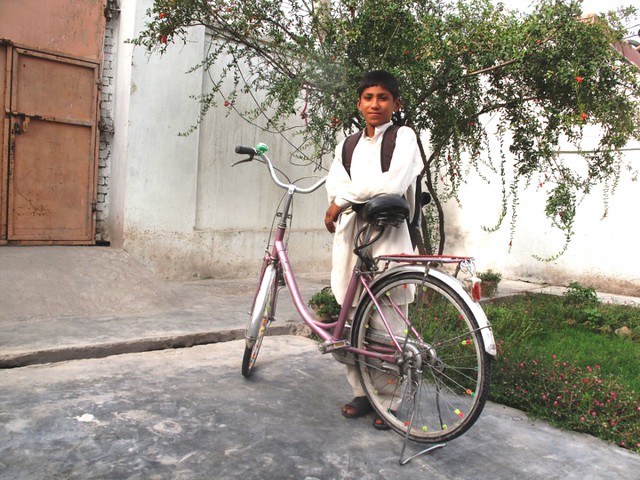 My little brother, Imran was riding on his bicycle to school yesterday. He got hit by a car from the back. Imran’s backpack which had a broken zipper was on his back. When he got hit, his backpack fell to the ground and all his books got scattered all around in the middle of the road. Imran got up unscathed and started picking up his books to put back in his backpack. Suddenly, he saw a big scorpion with its tail arched coming out of his unzipped backpack. He took out his shoe and squished it to the ground. Had he not hit by the car that scorpion inside his bag could have stung him or another student in his carpet classroom in school.
My little brother, Imran was riding on his bicycle to school yesterday. He got hit by a car from the back. Imran’s backpack which had a broken zipper was on his back. When he got hit, his backpack fell to the ground and all his books got scattered all around in the middle of the road. Imran got up unscathed and started picking up his books to put back in his backpack. Suddenly, he saw a big scorpion with its tail arched coming out of his unzipped backpack. He took out his shoe and squished it to the ground. Had he not hit by the car that scorpion inside his bag could have stung him or another student in his carpet classroom in school.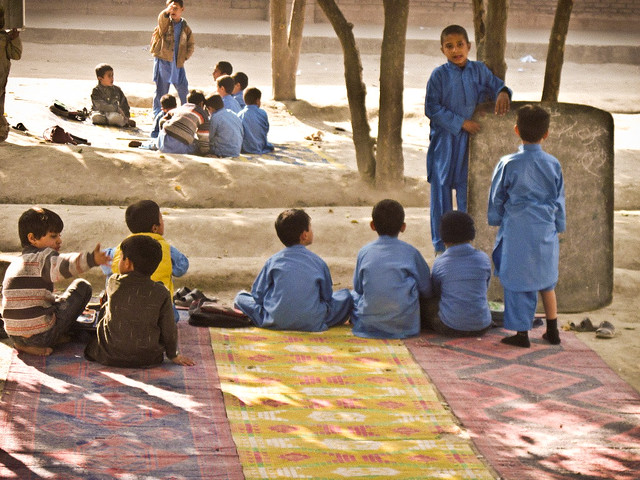
Tech Tools and Skills for Emergency Management
Together with my colleague, Una Moore, I am taking an online course on Tech Tools and Skills for Emergency Management at TechChange Institute for Social Change: http://techchange.org/. It’s a 3‑week course and today is the last day of week 1. It’s my first online course ever and Una is helping me a lot with how it works and the course materials too. Yesterday evening, we took turns and read aloud the first week course materials at a French restaurant in Kabul, Le Bistro. We are at Le Bistro again today doing our home work for the class. I am so glad that she is in Afghanistan while we are both taking this course together.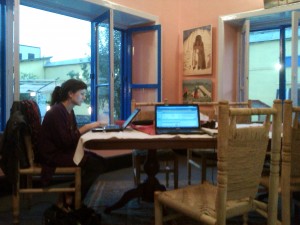
My 45 classmates come from a lot of different countries. This mix would be very good for sharing ideas and experiences throughout the course.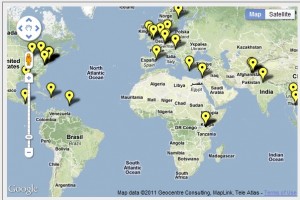
New Computer lab in Khogyani
 About five months ago, my colleague, Noor and I set up a computer and English language training lab in Kaga, Khogyani. Kaga is about 35 kilometers south west of Jalalabad city. It has a small main bazaar which is basically all on a one-hundred-meter long street. There are many small and sparsely located villages all around the main bazaar. It’s a beautiful place with a lot of snow in winter and cool weather in summer.
About five months ago, my colleague, Noor and I set up a computer and English language training lab in Kaga, Khogyani. Kaga is about 35 kilometers south west of Jalalabad city. It has a small main bazaar which is basically all on a one-hundred-meter long street. There are many small and sparsely located villages all around the main bazaar. It’s a beautiful place with a lot of snow in winter and cool weather in summer.
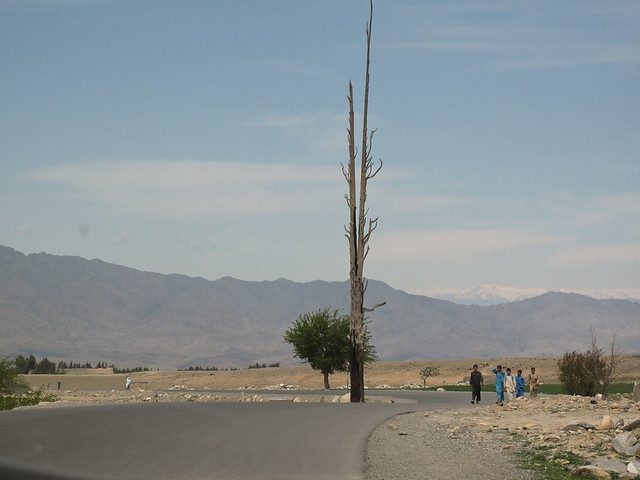
We went there back in April and set up a lab with five laptops, a printer and some English language materials. We also set up a small solar power system for the computer lab which included four solar panels, four car batteries, charge controllers and power inverters. When we were setting up this computer lab we trained a potential student, Hadi on the solar power and computer setup structure so that he can troubleshoot any potential problems by himself. Last week, I went to Kaga to check on the computer lab and everything and I was very impressed by how sustainable and well functioning the learning center had been for the past five months.
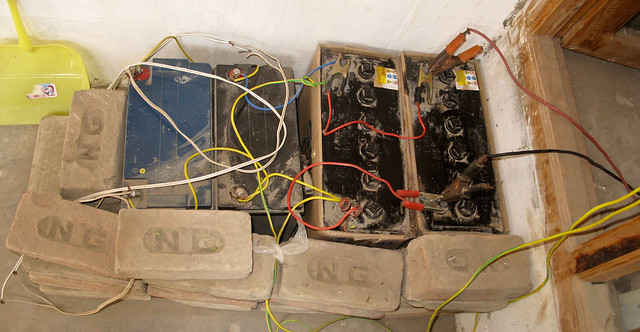
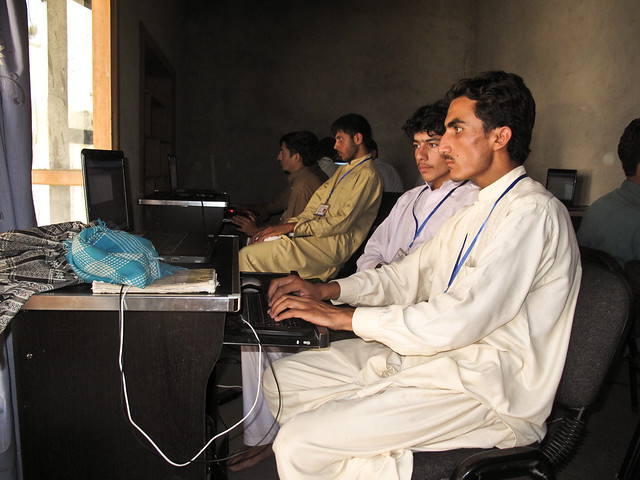
Approximately, three hundred students are learning computer skills and English language in this small center. It’s got 8 computer/ English language trainers, a manager and a guard/cleaner. One of the students, Hadi, who got a little training when we were setting up the lab, volunteers to help with technical and IT problems. It’s difficult to bring someone from Jalalabad every time they need technical support.
Not all of these students are taking computer classes right from the beginning. For computer programs training some knowledge of the English language is required. Beginner students have to take two months of English language training before they can be accepted in computer course.However, some students join the training center with a little prior knowledge of the computer language. The trainers will place them both in computer and in English language classes right from the beginning. In each of their English classes there are about 30 students and they all sit in carpet classrooms.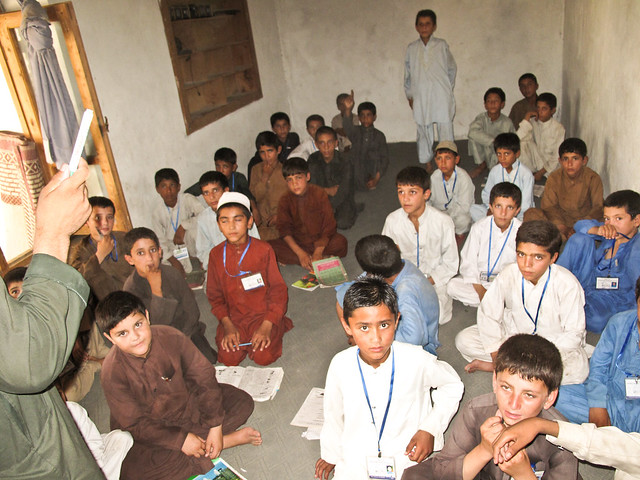
As many villages are sparsely located in Kaga, some students walk 30 kilometers everyday to attend their classes in this center. Shamshad is a nine-year-old beginner student who walks a long way together with his older brother and cousins to come here. He says, “I want to learn computer skills and English language and work in an international organization some day.†Coming to the center for his English class is his favorite to do of every day. “I like my teachersâ€, he says.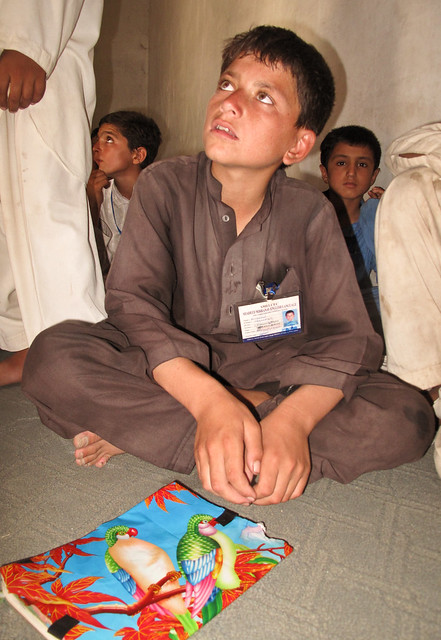
Under Taliban’s regime and before that, a family’s strength and prosperity here was judged by the number of sons one had. People fought over land and water a lot more often. They would train their sons to use a gun at a very young age for potential family fights/enmities. Those who did not have a son would train their daughters to use guns but that would be useful indoors only as women are not allowed to go out many people had very strict and traditional views about women’s rights here. They thought that women should not go out. If they. If they had to do so, they would have to wear ‘Islamic dress’ so that they are completely covered. This tradition is changing now and more and more families send their daughter to school. The person who runs this center is a former Afghan MP and he plans to start similar educational programs for women at this center If a family had no son they would be considered weak. This sexual prejudice seems to be changing rapidly. It’s no longer about the quantity of your children; it’s about the quality – getting good education and a decent job.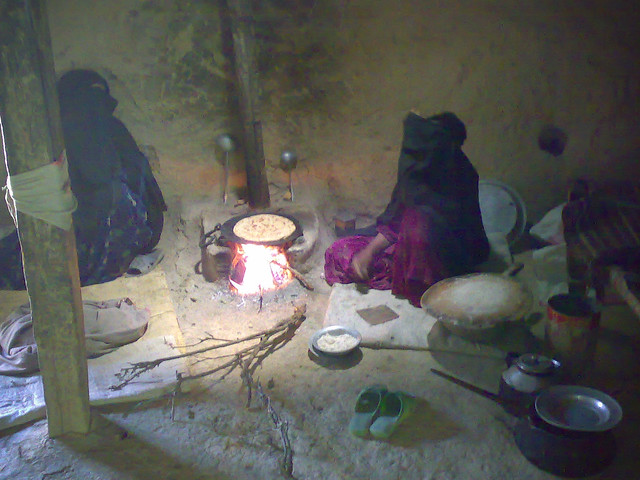
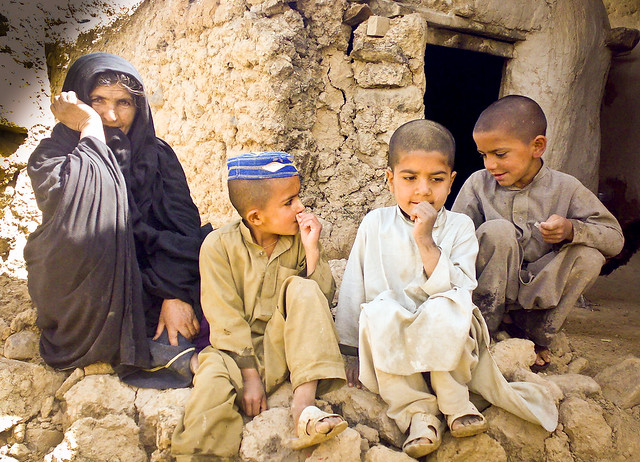
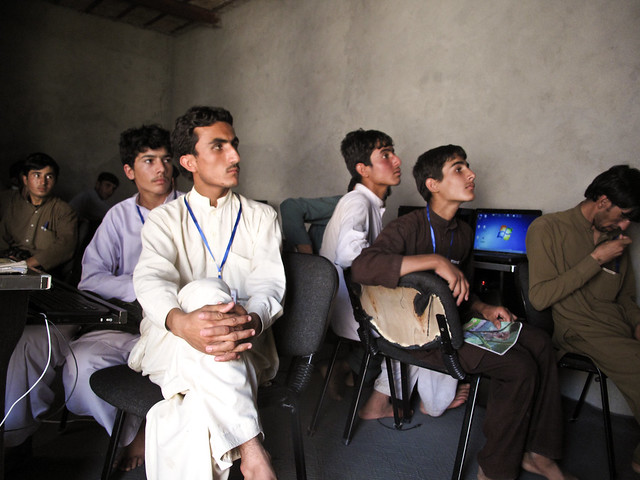
It’s a Taliban-infested area and a lot of people here used to support Taliban. Now Taliban is losing their support as people see it as a dead-end business. Shamshad and hundreds of other children like him are busy learning at this learning center as an after/before school activity. They come here with a lot of enthusiasm. They seem to be getting what they want and there is a lot of hope that they will make it there and they will have a bright future.

